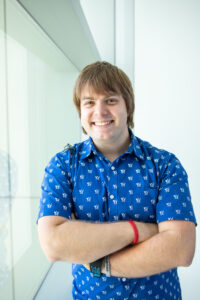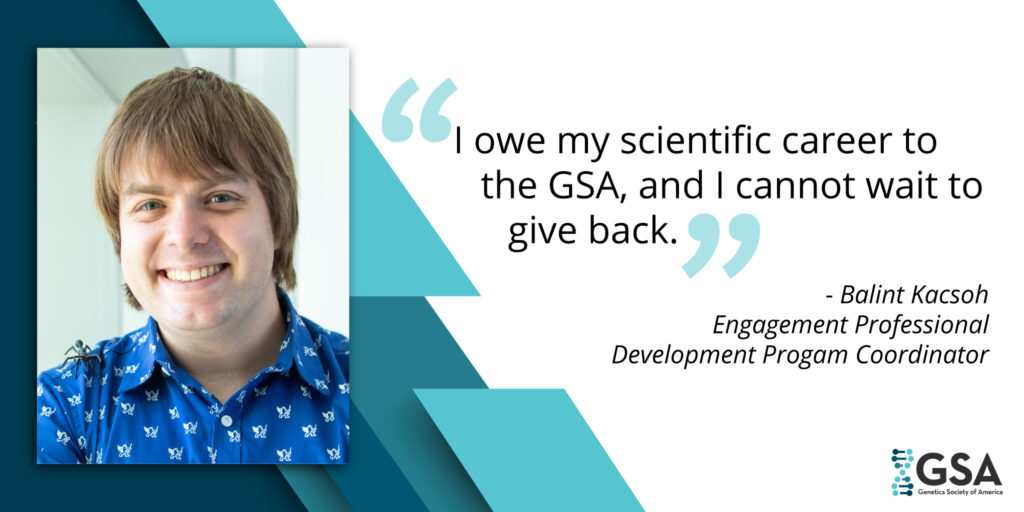GSA is excited to welcome Balint Kacsoh, PhD, as the Society’s Engagement Professional Development Program Coordinator! Read on to learn more about Balint, a past DeLill Nasser Award recipient, 2020 Larry Sandler Awardee, and former Early Career Leadership Program member.
Can you tell us a little bit about your background and what your career has looked like up to this point? How did you come to join the GSA staff?

My name is Balint Zoltan Kacsoh. I was raised in the beautiful capital of Hungary, Budapest, and in Macon, GA. From a young age, I was fascinated by biology—whether it be going to the aquarium and the zoo, to biology class—I wanted to understand how organisms function. My father, also Balint Kacsoh, brought me to his research lab at Mercer University School of Medicine, where I was able to keep my own cell cultures and “help” run experiments as young as age eight. Throughout lower, middle, and high school, my favorite subject was science. I even sought more rare classes to take, such as Genetics and Advanced Topics in Science.
I received my BS/MS from Emory University under the guidance of Dr. Todd Schlenke and Dr. Nathan T. Mortimer and received my PhD in the lab of Dr. Giovanni Bosco at the Geisel School of Medicine at Dartmouth College. I performed postdoctoral research in the lab of Dr. Shelley Berger at the University of Pennsylvania, funded by a Damon Runyon Cancer Research Fellowship, where my research focused on epigenetics of social structure. Throughout my time in research, I gained an appreciation for the immense importance of Science Communication and Science outreach, forming SciAnts with my wife to facilitate this goal.
I have been a member of the Genetics Society of America since I was an undergraduate. I have been afforded many opportunities, such as conference travel funding through the DeLill Nasser Award and participating in the Early Career Leadership Program (ECLP), that have shaped me as a scientist. These programs and opportunities were immensely important to me. Thus, when the opportunity to join the GSA staff presented itself, I immediately applied. I hope to make as big of a difference to the GSA as they have to me.
Can you describe your new position at GSA as the Engagement Professional Development Program Coordinator?
As a member of the engagement team, my job will entail working with members of the ECLP, organizing conference workshops and events, and implementing new ideas to benefit members and other constituents of the Society.
What upcoming projects are you most looking forward to working on in your new role?
I am excited for many different projects—first, I am looking forward to helping further grow the ECLP. The ECLP is a critical component in the lives of many young scientists, and I hope to further the community. I am also looking forward to designing conference mascots as part of our science outreach endeavor to engage a broad community. Finally, I am very excited about helming new programs to engage our community utilizing streaming platforms.
What about the GSA community do you find most inspiring?
I am most inspired by the support system in place in the GSA community. Simply asking for help—whether it be on Slack, email, or in person—creates opportunities for growth and support. I owe my scientific career to the GSA, and I cannot wait to give back.
What’s one piece of advice that you think every early career scientist should hear?
As a scientist, you are in a position of extreme privilege; therefore, I believe it is your moral obligation to willingly and freely disseminate information in which you are an expert. Only with this mentality, can we promote science literacy and science trust in the broader community.
What do you think would surprise your undergraduate self about your career path so far?
My undergraduate self would be surprised at my strong love of science outreach—not in that I love doing it, but in the strong need for it. I have experienced much more now compared to then, and have seen firsthand the need to support members outside of the scientific community.
Do you have any mentors? How have they played a role in your career journey?
I have had many mentors throughout my journey. This ranges from my father, who is a professor in a medical school, to my academic mentors. As an undergraduate, a postdoctoral researcher, Nathan T. Mortimer, took me under his wing. Under his mentorship, I began to think like a scientist, solving and making puzzles in biology. Because of his mentorship, I embarked on a journey of research. His continued mentorship across over a decade has helped me identify regions to improve in and what matters most to me.
What professional accomplishment to date are you most proud of?
I am most proud of receiving the Larry Sandler Award, presented by the Genetics Society of America at the Annual Drosophila Research Conference for the best Drosophila PhD thesis. Having the community I support and love recognize my thesis has meant the most to me. It represents a long and hard journey through graduate school, and I am extremely proud of this accomplishment.
What’s your idea of a perfect weekend?
My perfect weekend is sitting outside in our yard with my wife on a cool afternoon while grilling some of our favorite foods. Having a soccer game on the tablet—on low volume, of course—would be a bonus.































